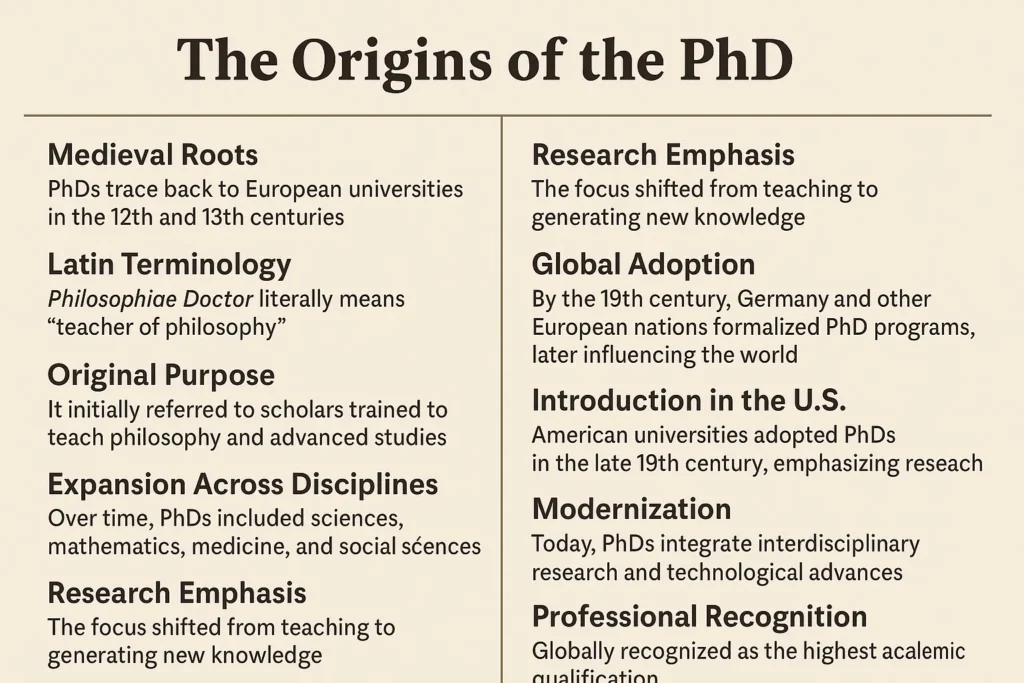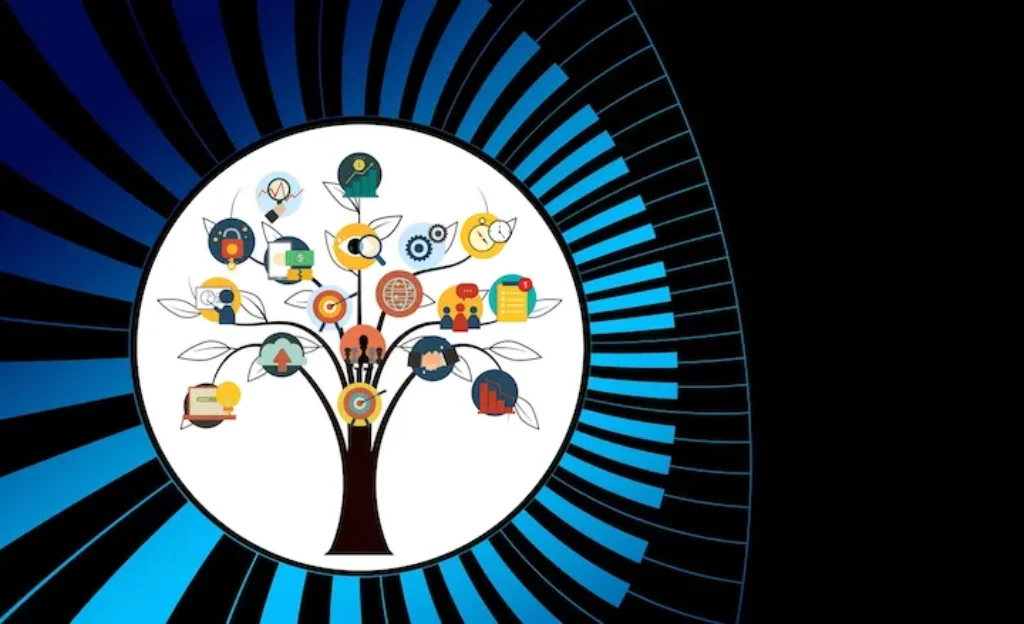
In today’s knowledge-driven world, advanced degrees are more than just accolades—they’re gateways to expertise, innovation, and career growth. Among these, the PhD, or Doctor of Philosophy, stands out as the pinnacle of academic achievement. Yet, despite its global recognition, many people aren’t entirely sure what a PhD really represents, how it differs from other doctorates, or what the journey involves.
This guide dives deep into the meaning, history, relevance, and practical implications of a PhD. Whether you’re a student, professional, or lifelong learner, you’ll gain clarity to make informed decisions about pursuing advanced education.
Table of Content
Executive Summary
A PhD is a research-focused degree that shows mastery in a specific field and the ability to create original knowledge. Despite its name, “Philosophy” reflects historical roots rather than a focus solely on philosophy. Today, PhDs exist across almost every discipline—from science and engineering to humanities and social sciences.
Earning a PhD demands years of dedicated study, research, and scholarly writing, culminating in a dissertation that contributes new insights. While the path is challenging, the rewards—intellectual growth, career opportunities, and recognition as an expert—make it a highly valuable pursuit.
Why Understanding the PhD Matters
PhDs are surrounded by misconceptions:
- Some think it’s limited to philosophy or humanities.
- Others assume it’s the same as professional doctorates like an MD or JD.
- Some underestimate the time, effort, and commitment required.
Clearing up these misunderstandings is crucial. A clear understanding helps you choose the right path, set realistic expectations, and appreciate the degree’s value in research, innovation, and leadership.
The Origins of the PhD
Understanding a PhD’s history gives perspective on its significance today:

- Medieval Roots: PhDs trace back to European universities in the 12th and 13th centuries.
- Latin Terminology: Philosophiae Doctor literally means “teacher of philosophy.”
- Original Purpose: It initially referred to scholars trained to teach philosophy and advanced studies.
- Expansion Across Disciplines: Over time, PhDs included sciences, mathematics, medicine, and social sciences.
- Research Emphasis: The focus shifted from teaching to generating new knowledge.
- Global Adoption: By the 19th century, Germany and other European nations formalized PhD programs, later influencing the world.
- Introduction in the U.S.: American universities adopted PhDs in the late 19th century, emphasizing research.
- Modernization: Today, PhDs integrate interdisciplinary research and technological advances.
- Professional Recognition: Globally recognized as the highest academic qualification.
- Ongoing Evolution: Emerging fields like AI, data science, and sustainability continue to reshape PhDs.
What a PhD Represents Today
Despite its historical connection to philosophy, a modern PhD:
- Covers almost every academic field: From physics to anthropology.
- Demonstrates research mastery: Holders conduct original studies that advance knowledge.
- Highlights critical thinking: Problem-solving, analysis, and intellectual rigor are central.
- Supports career growth: Opens doors to academia, industry, policy, and consulting.
Unlike professional doctorates (MD, JD), which focus on applied practice, a PhD emphasizes the creation of new knowledge. It’s inherently scholarly, research-intensive, and globally respected.
The PhD Journey: Step by Step
While specifics vary by country and discipline, a typical PhD path includes:
- Coursework: Build foundational knowledge and research skills.
- Comprehensive Exams: Test mastery of core concepts.
- Research Proposal: Define a unique research question.
- Dissertation Research: Conduct original studies—the heart of the PhD.
- Writing the Dissertation: Compile findings into a formal document.
- Defense: Present and defend research before experts.
- Publication and Dissemination: Share findings in journals or conferences.
PhDs usually take 3–7 years, depending on research complexity.
Skills Acquired During a PhD
A PhD is transformative. Beyond academic expertise, it equips you with highly transferable skills:

- Critical Thinking: Analyze complex problems and create solutions.
- Research Methodology: Design studies, collect and analyze data rigorously.
- Communication: Present complex ideas clearly in writing and presentations.
- Project Management: Manage long-term projects and meet deadlines.
- Teaching and Mentorship: Lead and guide others while improving leadership skills.
These skills are valuable in academia, industry, policy, and entrepreneurship alike.
Career Opportunities for PhD Holders
A PhD opens doors to diverse career paths:
- Academia: Professor, researcher, or postdoctoral scholar.
- Industry R&D: Lead innovation in tech, pharmaceuticals, or engineering.
- Policy & Think Tanks: Influence government and societal decisions.
- Consulting: Provide expertise for complex problem-solving.
- Entrepreneurship: Develop research-based products or startups.
PhD holders often enjoy higher salaries, flexible careers, and leadership opportunities.
A PhD opens the door to specialized and high-impact careers in academia, research, and emerging technical fields like data science and engineering.
- Those interested in applying research skills to real-world analytics can explore our guide on How to Become a Data Scientist.
- For learners focused on technical system design and large-scale data operations, What Does a Data Engineer Do explains the essential tools and career growth paths.
- If you’re considering a leadership route after doctoral research, What Is Project Management shows how academic discipline translates into project execution and strategy.
How a PhD Differs from Other Doctorates
- PhD (Doctor of Philosophy): Focused on original research.
- MD (Doctor of Medicine): Clinical practice and patient care.
- JD (Juris Doctor): Legal practice.
- EdD (Doctor of Education): Applied educational leadership.
- DBA (Doctor of Business Administration): Applied business research.
The PhD stands out for its emphasis on research rigor and scholarly contribution, rather than direct professional practice.
Global Recognition and Relevance
PhDs are recognized worldwide as the highest academic degree. Current trends include:

- Interdisciplinary Research: Combining fields to solve complex problems.
- Applied Focus: Research with real-world impact is increasingly valued.
- Technological Integration: AI, data analytics, and biotech reshape research.
- International Mobility: Enables global careers in research and industry.
Today, a PhD is more than a title—it’s a badge of intellectual leadership and innovation.
Benefits of Pursuing a PhD
- Expertise Recognition: Establish authority in a chosen domain.
- Career Advancement: Access leadership roles and higher earning potential.
- Intellectual Growth: Develop deep knowledge, critical thinking, and problem-solving skills.
- Contribution to Society: Original research can influence policy, technology, and culture.
- Networking: Join global academic and professional communities.
Challenges of the PhD Journey
While rewarding, a PhD demands dedication:
- Time Commitment: Programs often span 3–7 years or more.
- Emotional Resilience: Research setbacks are common.
- Financial Considerations: Funding varies by institution.
- Work-Life Balance: Long hours and independent work can be taxing.
Preparation, realistic expectations, and a support system are crucial.
Tips for Aspiring PhD Candidates

- Choose Your Topic Carefully: Passion and relevance matter.
- Select the Right Supervisor: Mentorship is key.
- Plan Finances: Explore scholarships, grants, and assistantships.
- Develop Soft Skills: Communication, collaboration, and resilience are essential.
- Stay Curious: Embrace challenges as opportunities for growth.
Famous PhD Holders and Their Impact
- Marie Curie (Physics): Pioneered research on radioactivity.
- Noam Chomsky (Linguistics): Revolutionized modern linguistics and political theory.
- Tim Berners-Lee (Computer Science): Invented the World Wide Web.
- Jane Goodall (Ethology): Renowned primatologist and conservationist.
- Stephen Hawking (Cosmology): Groundbreaking work in black holes and theoretical physics.
Their achievements highlight the global impact a PhD can have.
De-Risking Your PhD Investment
Before committing, consider:
- Career alignment with personal goals.
- Funding and scholarships.
- Institution’s reputation and resources.
- Supervisor expertise and compatibility.
- Potential for publications and real-world impact.
Expected Timeline and Milestones
| Milestone | Duration | Outcome |
|---|---|---|
| Coursework Completion | 1–2 years | Strong foundational knowledge |
| Comprehensive Exams | 6–12 months | Readiness for independent research |
| Research Proposal | 3–6 months | Defined research focus |
| Dissertation Research | 2–4 years | Original research contribution |
| Writing & Defense | 6–12 months | Completion and graduation |
Conclusion
A PhD is more than an academic title—it’s a journey of intellectual rigor, innovation, and societal contribution. Understanding what a PhD represents helps aspiring scholars, professionals, and curious minds appreciate the dedication and impact behind this prestigious degree.
For those ready to commit, a PhD offers mastery, influence, and a lifetime of learning.

